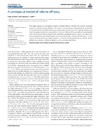Please use this identifier to cite or link to this item:
https://accedacris.ulpgc.es/jspui/handle/10553/43214
| Title: | A conceptual model of referee efficacy | Authors: | Guillén García, Félix Feltz, Deborah L. |
UNESCO Clasification: | 61 Psicología | Keywords: | Referee behavior Referee confidence Sports officiating Umpires Sport psychology |
Issue Date: | 2011 | Journal: | Frontiers in Psychology | Abstract: | This paper presents a conceptual model of referee efficacy, defines the concept, proposes sources of referee specific efficacy information, and suggests consequences of having high or low referee efficacy. Referee efficacy is defined as the extent to which referees believe they have the capacity to perform successfully in their job. Referee efficacy beliefs are hypothesized to be influenced by mastery experiences, referee knowledge/education, support from significant others, physical/mental preparedness, environmental comfort, and perceived anxiety. In turn, referee efficacy beliefs are hypothesized to influence referee performance, referee stress, athlete rule violations, athlete satisfaction, and co-referee satisfaction. | URI: | https://accedacris.ulpgc.es/handle/10553/43214 | ISSN: | 1664-1078 | DOI: | 10.3389/fpsyg.2011.00025 | Source: | Frontiers in Psychology, v. 2 (Article 25) |
| Appears in Collections: | Artículos |
SCOPUSTM
Citations
97
checked on Jun 8, 2025
WEB OF SCIENCETM
Citations
92
checked on Feb 8, 2026
Page view(s)
17
checked on Jan 11, 2026
Download(s)
3
checked on Jan 11, 2026
Google ScholarTM
Check
Altmetric
Share
Export metadata
Items in accedaCRIS are protected by copyright, with all rights reserved, unless otherwise indicated.
